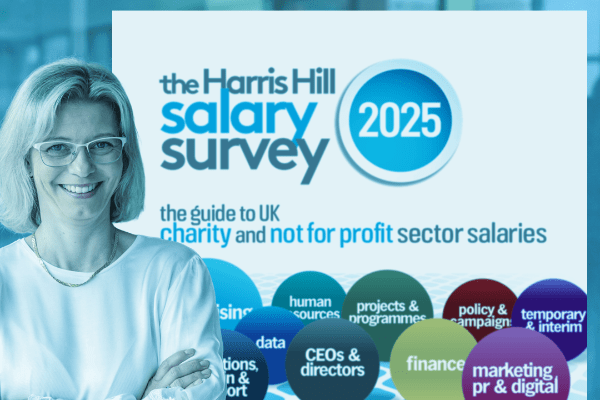Our brand new salary survey for 2018 has just been released, with current market rates for roles in all the major job functions within charities and not for profit organisations.
As ever, we've also taken a look at the key trends and changes we've observed in recruiting for the sector over the past year, in our market update.

2018 market update
It's certainly been another eventful year for the third sector, not least for fundraisers, PR and data teams, among many others.
Few sectors are currently enjoying a golden period of good times and growth and the charity sector would appear to be no exception, with little sign of significant expansion. Yet given the formidable challenges many organisations have been grappling with, it's encouraging to have seen demand from employers and the flow of vacancies holding remarkably steady throughout the year, suggesting a sector in reasonably robust health.
Also holding steady is the shortage of candidates in many key areas, and this year we've seen a marked increase in counter-offers as organisations bid to retain their existing talent. And while many won't yet have seen any significant change, there are some signs that the ongoing scenario of high demand/low supply is beginning to exert greater pressure on salaries.
Flexibility is your friend
In discussing this year's trends with our specialist teams, several common themes emerged, but top of the list by far - highlighted in all areas from finance to fundraising - is a steep rise in candidate requests for flexible working arrangements.
Whether it's technology making home working more viable, changes in the work itself, or simply a greater appreciation of Dolly Parton's wisdom, the standard nine-to-five is no way to make a living for an increasing number of candidates, particularly at senior levels.
Working one day per week at home is especially popular, as are flexible hours (often to accommodate family/childcare responsibilities), or a four-day week, freeing up a day for activities like voluntary/trustee work or a secondary career.
While some organisations remain unwilling or unable to accommodate these arrangements, it's a major selling point for those who do. Strong candidates will typically have multiple offers at the moment, and between one with the desired flexibility and another without, there's very little question as to which contract they'll sign.
Charities struggling to retain experienced talent could benefit from becoming more flexible too, removing one of the key motivators for staff to change jobs.
The place to be
Recently we've also seen location becoming a more important factor in candidate choices.
It's probably fair to say that advances in transport haven't quite kept pace with those in technology (or those of an elderly tortoise, for those reliant on a certain southern rail firm) - and this combination may explain why fewer candidates appear willing to contemplate the long commuting times of the past.
With several offers in play, a convenient location can often trump all other considerations.
Minimum wage or living wage?
As ever, salary increases are easier to find at senior levels where candidates are scarce, than at entry level where pay rises are rather more elusive.
But the last year has seen some welcome development here too, thanks to (at time of writing) more than 800 charities choosing to become accredited Living Wage employers. This means offering at least the minimum salaries established by the Living Wage Foundation - something we're also committed to at Harris Hill.
The picture's not entirely rosy though, as the recent Low Pay In The Charity Sector report makes clear, with many smaller charities unable to meet these minimums (the 800 signed up are predominantly the bigger names) and a full 26% of charity workers currently earning less than the real living wage.
For the purposes of our salary survey in providing recommendations, we've excluded salaries beneath the Living Wage minimum, but for now at least, they can certainly still be found.
Battle of the sexes
No current salary discussion would be complete without mention of the Gender Pay Gap of course.
With a roughly 65% female workforce it's probably little surprise that the charity sector scores more favourably than many: recent analysis published in Third Sector, Civil Society and elsewhere showed an average gap of 8% in favour of men, while 20% of participating organisations reported gaps in favour of women.
And while women accounted for 71% of the lowest-paid employees, they also made up 63% of the highest-paid individuals, although purely at chief executive level Third Sector's 2017 research found just 32% were female - a trend we're proud to be bucking with women accounting for 48% of our CEO placements and 57% of our non-executive appointments in the past year.
There's little else to add here from our own experience: some have suggested that pay requests are slightly more likely to originate from men and flexible working from women, or that requests may be more readily granted for one gender than another, but with zero actual evidence to support this (hey, it's 2018, who needs facts any more?) we'll just leave that right there. Answers on an ethically-sourced recyclable postcard if your DM team have any going spare.
GDPR (and PR) challenges
Few of our clients have yet been reporting or anticipating a major impact on revenues from the introduction of GDPR, but there's been strong demand in areas like marketing and communications, data, digital and HR for people with GDPR expertise, mainly on a temporary or contract basis.
And while the recent string of high-profile allegations, revelations and resignations from major charities may not be great PR for the sector, we've yet to see any noticeable impact on recruitment, with most of the sector's best-known names (including those concerned) remaining popular employers of choice among candidates.
-

Opportunity for all
Find out how we’re working to deliver more diverse, equitable and inclusive recruitment…
-

Recruiting a charity CEO?
Our executive recruitment specialists have an exceptional record of successful CEO, chair, trustee and…
-

Charity sector salaries
Our 2025 Salary Survey has the latest rates and expert insight for roles throughout the sector.













